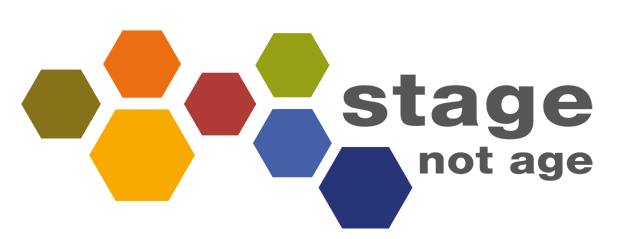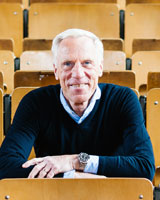Prof. Dr. Ingo Froböse
Ingo Froboese is a university professor for prevention and rehabilitation in sports at the German Sport University in Cologne. He is the head of the Institute for Movement Therapy and Movement-Oriented Prevention and Rehabilitation.
Herr Prof. Dr. Froboese, as a professor for prevention and rehabilitation at the German Sport University in Cologne, you have been dealing with health and well-being in connection with sport and exercise for a long time. You are the author of numerous publications on this subject.
People in the industrialized countries not only live longer, the years of good health are also increasing noticeably. What are the reasons for this positive development?
In fact, people in industrialized countries live longer and longer in recent decades. On average around 80 years, women still two/three years longer. This is because we have better hygienic conditions, lower child mortality and above all better acute medical care. The problem, however, is that this does not go hand in hand with a higher quality of life. Although people live longer, they can also become chronically ill much earlier due to their lifestyle, too much sugar and unhealthy nutrition as well as too little exercise. For example, people in Scandinavia live 17 to 19 years after the age of 60 with a high quality of life and without major physical ailments, but in Germany only 7 to 9 years. Based on this, you can already see that it depends very much on how much value is placed on prevention, and we are simply bad at that in Germany. We have a high level of acute medical care, and we also take care of chronic illnesses very well, but without really getting to the root of the problem. Accordingly, for us in Germany it means: We live longer, but that is not always associated with a good quality of life.
What can sport or exercise do to help us live healthily for as long as possible?
Sport and exercise can ensure a higher quality of life and also prolong life. We know that athletes typically live 4 to 6 years longer because they are fitter. They do a lot for their cardiovascular system, for their metabolism, for their mental performance, because they have better blood circulation and better production and conversion processes. In addition, they have many preventive factors against the greatest risk factors in our society. The cancer risk is significantly more positively influenced by sport and exercise, the same applies to the risks of heart attack and stroke or diabetes. This means that sport and exercise can be of great preventive value for all internal organs, because only what is used develops, what remains unused atrophies. So we can avoid all the chronic lifestyle-related diseases.
There are more and more sports and exercise offers for people "xplus", e.g. 50plus or 60plus. Does it make sense to base the offer on a person's age, or are there other parameters that make more sense?
Do we need special programs for 50plus? No, we don’t. It depends on the requirements and skills. I know 30-year-olds who would really need age programs. But when it comes to the right approach, 30-year-olds are more likely to be addressed through event experiences and fun things, while older people tend to be more cerebral, use reasoning, they know that it is worth doing something. It's important that we don't have to gear our offerings to age, but to people's capabilities. Here, the cardiovascular function is of particular importance to me. It defines the performance of the heart and can be determined very nicely on the bicycle ergometer. If you very roughly - that's an age orientation, but it works quite well in general - have a pulse of 180 minus your age in the course of endurance training, when running or on the bike, you're doing everything right. Age doesn't matter at all, if you're trained, then you can tolerate significantly higher and greater exertion. For me, the bodily muscle mass is becoming more and more important. Men should have 40 percent, women 35. Muscle mass, as the largest metabolic organ, is one of the most important parameters that, in my opinion, the medical profession takes in consideration too little or not at all. But in the end, it keeps the quality of life high because it is the stimulator for many internal organs, even for the brain, and you should give this more attention.
Your book "The Health Formula of 100-Year-Olds" deals with the healthiest and oldest people in the world. What is the recipe for success in becoming 100 years old and, and: Is it too late at some point to start living a healthy lifestyle?
As a rule, these people do not come from industrialized nations, but are inhabitants of villages and towns that are literally located in the middle of nowhere. But these people have sensible food, not industrial food, and that is a very important variable. They don't eat too much, but when they do eat, it's high quality. They drink a little alcohol, but that too in moderation. They are happy and optimistic, are involved in social structures, have family and friends relatively close to them, usually pursue a life-long task, sometimes even a job. They move a lot, because they engage in many activities, e.g. in agriculture, or they cultivate their own garden or field. But above all, they allow for leisure, they are more relaxed and less stressed because they live in a different environment. This means that they have a better lifestyle, which is crucial for a long life. What we observe here with us is associated with a very stressful, unhealthy lifestyle.
Fitness trackers are becoming increasingly popular, and many smartphones now also have a variety of sensors built in that measure vital data. How well can these readings help users live a healthy life?
Amateur athletes use them to find out how much they move at the beginning and thus get some orientation about their activities.
For top athletes, of course, it's training equipment, training information that they need. The normal fitness and amateur athlete doesn't really need a fitness tracker. Of all the metrics you can measure, if you measure them correctly, the only one that makes sense is the heart rate. It is a good control parameter for my endurance training load. Apart from that, I don't need any other data. I don't need a temperature reading, I don't need a sleep reading, I don't need an oxygen saturation reading because the vast majority of people can't interpret that data correctly. You shouldn't give people readings that they can't understand and interpret, and certainly don't need. A smartwatch suggests an ECG-accurate recording of my heart function, which drives me crazy rather than helping me if I can't interpret the data correctly.
Conclusion: There are many sensors built in that measure vital data, but I don't need them if I listen to myself, know my body's needs and can thus simply assess myself better. Body awareness is the focus here, understanding the voice of the body again, that's what you should learn. That's where the tracker helps and supports, but it doesn't replace it.

